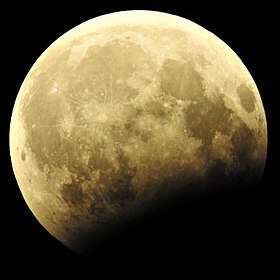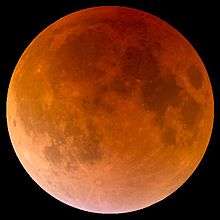June 2012 lunar eclipse
A partial lunar eclipse took place on 4 June 2012. It was the first of two lunar eclipses occurring in 2012, the second eclipse set to happen on 28 November. The moon was 37.042% covered by the Earth's northern umbral shadow at maximum eclipse. The portion of the moon inside the umbral shadow was illuminated by sunlight refracted through the Earth's atmosphere, rendering it much dimmer and with a reddish hue.
| Partial eclipse | |||||||||||||
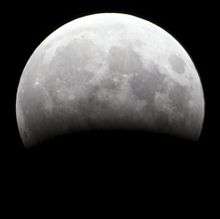 From Australia, 11:06 UTC | |||||||||||||
| Date | 4 June 2012 | ||||||||||||
|---|---|---|---|---|---|---|---|---|---|---|---|---|---|
| Gamma | 0.82480 | ||||||||||||
| Magnitude | 0.37042 | ||||||||||||
| Saros cycle | 140 (25 of 80) | ||||||||||||
| Partiality | 126 minutes, 36 seconds | ||||||||||||
| Penumbral | 270 minutes, 8 seconds | ||||||||||||
| |||||||||||||
Visibility
This lunar eclipse, occurring during June's "Strawberry" full moon[1] was completely visible over Australia, rising over eastern Asia and setting over western North America. New England and eastern Canada missed the entire eclipse since the event began after moonset in those regions. The eclipse was visible in the central United States.
Amongst those in North America, observers in western Canada and the USA had the best views with moonset occurring sometime after mid-eclipse.
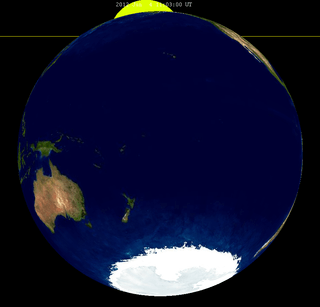 This simulation shows the earth at the time of greatest eclipse as viewed from the center of the moon. The sun is seen here as a partial solar eclipse over the Earth's north pole. |

Gallery
 From Australia, 11:06 UTC
From Australia, 11:06 UTC Albuquerque, New Mexico, 11:20 UTC
Albuquerque, New Mexico, 11:20 UTC.jpg) Marikina City, Philippines, 11:33 UTC
Marikina City, Philippines, 11:33 UTC- From Beijing at moonrise, 12:09 UTC
.jpg) From Japan at moonrise, 11:53 UTC
From Japan at moonrise, 11:53 UTC Time lapse image from Villa Gesell, Argentina
Time lapse image from Villa Gesell, Argentina
Related eclipses
Eclipses of 2012
Lunar year (354 days)
This eclipse was one of five lunar eclipses in a short-lived series. The lunar year series repeats after 12 lunations or 354 days (Shifting back about 10 days in sequential years). Because of the date shift, the Earth's shadow will be about 11 degrees west in sequential events.
| Lunar eclipse series sets from 2009–2013 | ||||||||
|---|---|---|---|---|---|---|---|---|
| Ascending node | Descending node | |||||||
| Saros # Photo |
Date Viewing |
Type chart |
Gamma | Saros # Photo |
Date Viewing |
Type chart |
Gamma | |
| 110 | 2009 Jul 07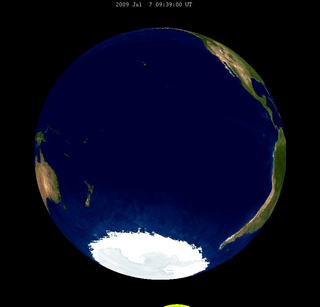 |
penumbral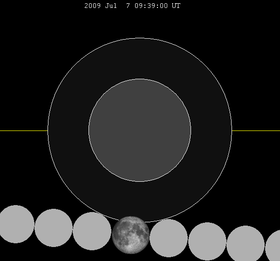 |
-1.4916 | 115 |
2009 Dec 31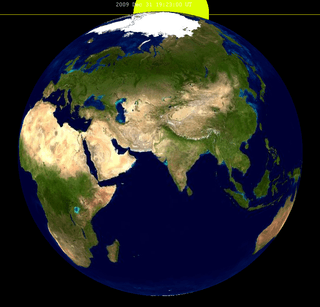 |
partial |
0.9766 | |
120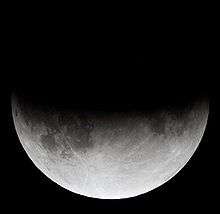 |
2010 Jun 26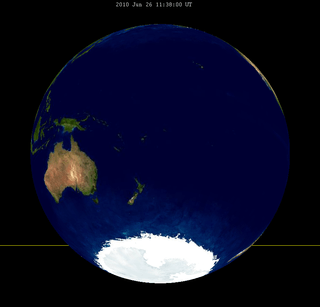 |
partial |
-0.7091 | 125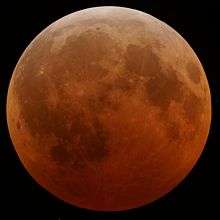 |
2010 Dec 21 |
total |
0.3214 | |
130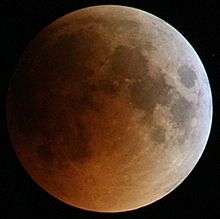 |
2011 Jun 15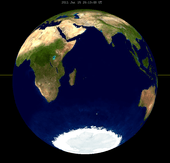 |
total |
0.0897 | 135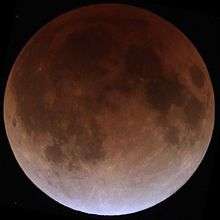 |
2011 Dec 10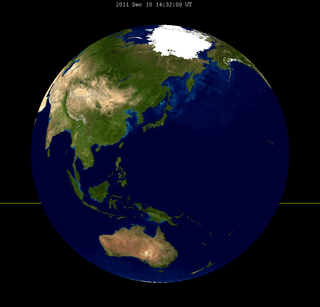 |
total |
-0.3882 | |
140 |
2012 Jun 04 |
partial |
0.8248 | 145 | 2012 Nov 28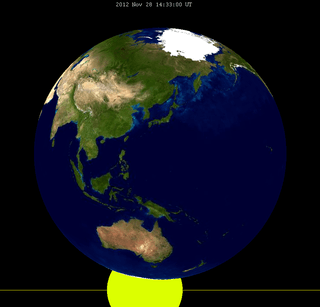 |
penumbral |
-1.0869 | |
| 150 | 2013 May 25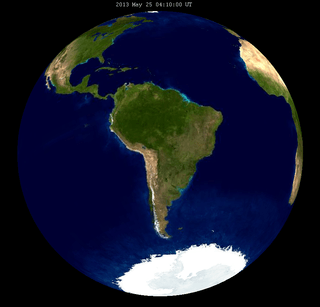 |
penumbral |
1.5351 | |||||
| Last set | 2009 Aug 06 | Last set | 2009 Feb 9 | |||||
| Next set | 2013 Apr 25 | Next set | 2013 Oct 18 | |||||
Half-Saros cycle
A lunar eclipse will be preceded and followed by solar eclipses by 9 years and 5.5 days (a half saros).[2] This lunar eclipse is related to two annular solar eclipses of Solar Saros 147.
| May 31, 2003 | June 10, 2021 |
|---|---|
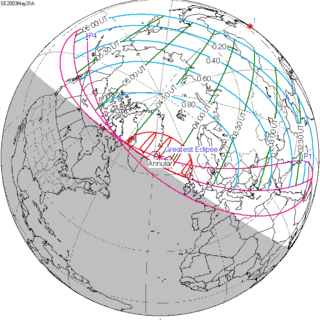 |
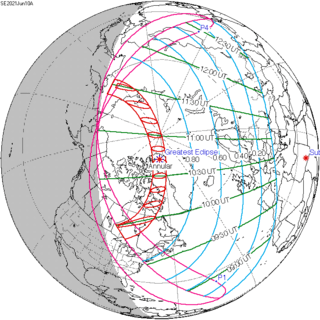 |
See also
- List of lunar eclipses and List of 21st-century lunar eclipses
References
- "Partial Eclipse of the Strawberry Moon". NASA. 28 May 2012. Retrieved 4 May 2020.
- Mathematical Astronomy Morsels, Jean Meeus, p.110, Chapter 18, The half-saros
External links
| Wikimedia Commons has media related to Lunar eclipse of 2012 June 4. |
- 2012 Jun 04 chart: Eclipse Predictions by Fred Espenak, NASA/GSFC
- Hermit eclipse: 2012-06-04
- NightSkyInfo.com: Lunar Eclipse Monday, 4 June 2012
